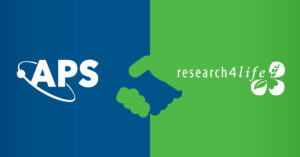Research4Life welcomes American Physical Society as a new partner

In a recent interview, Colin Adcock, Publishing Manager for Open Science at the American Physical Society (APS), shared their enthusiasm about joining Research4Life. This partnership aligns with APS’s core mission to foster societal change and education through science, emphasizing diversity and equality. The inclusion of APS to the Research4Life partnership means an incredible expansion of our resources in the field of physics. We’re adding all of the APS journals and their full archives to researchers and institutions in 115 countries.
What is your motivation for joining Research4Life?
Colin: ‘At the American Physical Society it is our mission to advance and diffuse the knowledge of physics for the benefit of humanity. This is a global mission, and one that seeks positive societal change and education for all through the dissemination of science and the enhancement of diversity and equality. Joining Research4Life addresses key elements of this to support a wide range of researchers who may otherwise be excluded from the dissemination of academic research.’
How will your partnership with Research4Life impact access to physics knowledge in developing countries?
Colin: ‘With Research4Life, we can bring this knowledge, education, and dissemination to a broad audience in over 100 lower and middle income countries and territories. This partnership vastly improves the access to fundamental knowledge, without cost or barriers. At the same time, APS is announcing funding support for open access publishing for authors from these countries across the Physical Review series — in both our hybrid and gold journals. This ensures that authors can take part in the global research landscape in an increasingly open access future.’
Can you elaborate on the importance of your new open access support policy?
Colin: ‘By joining Research4Life and embarking on a comprehensive new open access program, APS is removing historic barriers to access and engagement. This ensures that the voices and impact of researchers across the realms of physics can be seen and heard. We are committed to making physics research more accessible and inclusive, reflecting the diverse voices in the scientific community.’
‘With our new program, open access will be the default route for eligible authors. This removes any requirement for manual waiver requests and potential societal barriers that come with them. Furthermore, inclusion in this program is not seen by journal editors to further support impartiality. This new initiative will be available to new submissions from 1 January 2024.’
Is there any content (any specific journal, book etc) you would particularly like to highlight to Research4Life users?
Colin: ‘The Physical Review journals are widely regarded as being some of the most important and highest quality scientific journals in the world. The journals are run editorially by scientists, for scientists, with any surplus made directly benefiting the global communities that APS serves for the betterment of science. Our journals have published research leading to the Nobel Prize in physics in each of the last 13 years.’
‘Physical Review Letters and Physical Review X are the highest impact journals of their kind in the ‘Physics, Multidisciplinary’ category, while Physical Review Letters is the 13th most influential scientific journal in the world, being 85 times more influential than the average title.’
Do you participate in any other initiatives that provide access to your content and which would be complementary to Research4Life?
Colin: ‘APS has supported researchers in the global south to access the Physical Review journals for many years. Since 2006, we have worked with INASP and the Strengthening Research and Knowledge System program to provide free online access for non-for-profit institutions and have continued to provide such access after those programs closed. Our partnership with Research4Life will continue this tradition and provide access to many more researchers and institutions globally. We also work with the ICTP eJDS to provide articles to researchers who may not have sufficient internet access or bandwidth for accessing journal platforms.’
‘In addition to our work to support researchers in lower and middle income countries, APS also provides free access to public schools and high schools in the U.S., enabling students of all ages to access the best research in physics.’
Are you a Research4Life user and do you want to browse through the titles offered by APS? Log in to Research4Life and select ‘Publisher’ in the ‘Find by’ menu at the top. Alternatively, you can perform an advanced summon search.
Not a user yet? Check if your institution has access, and if not, if it is eligible for access.





